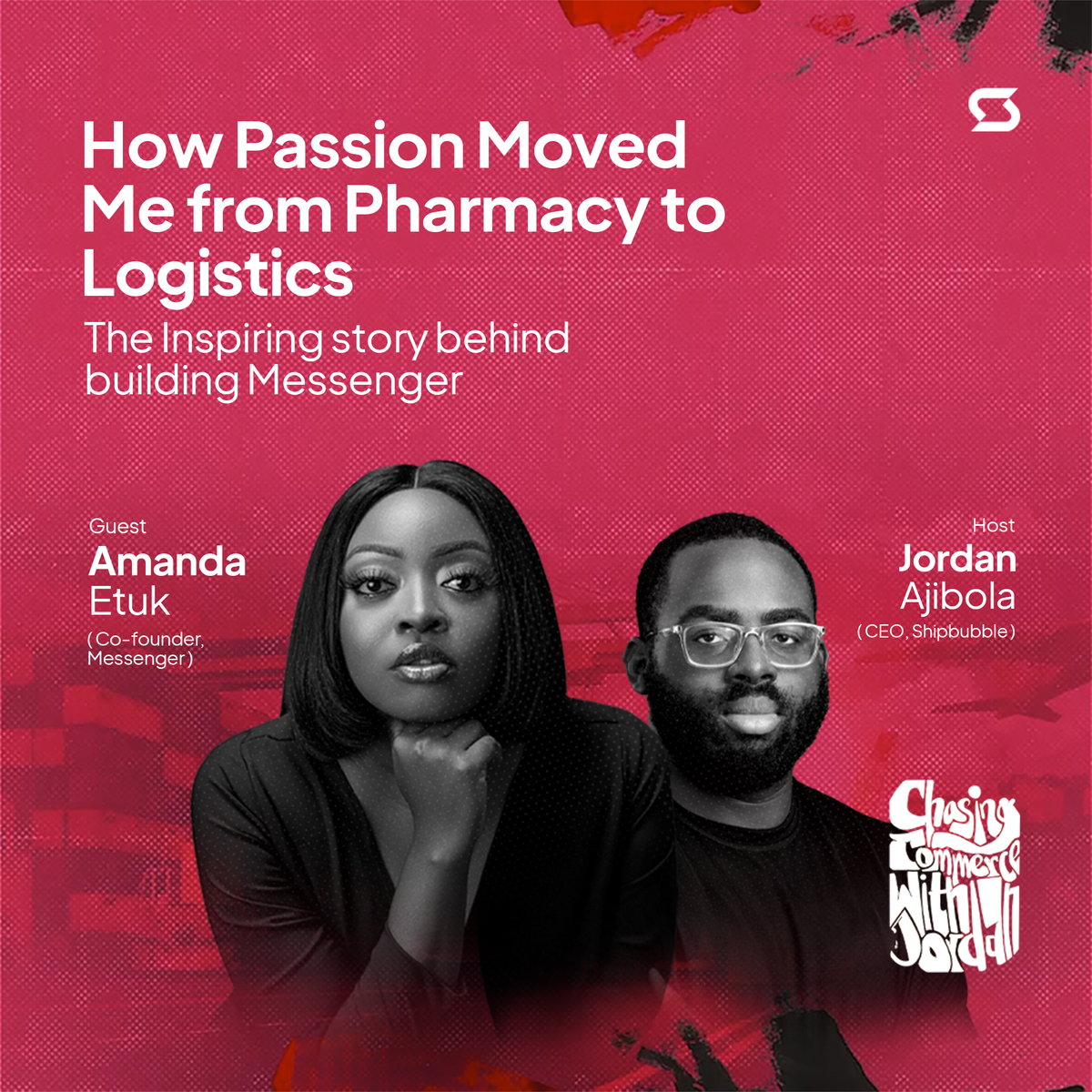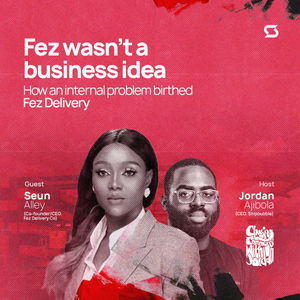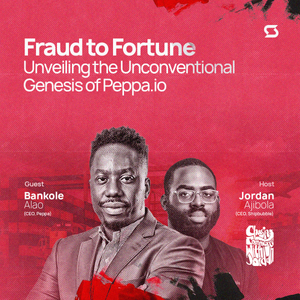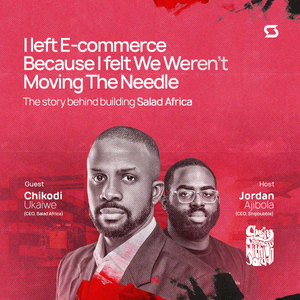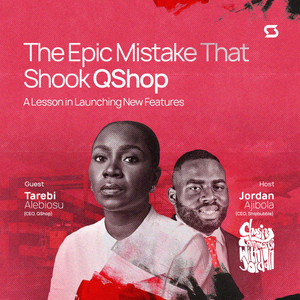In this episode of "Chasing Commerce with Jordan," we dive into the world of logistics and e-commerce alongside Amanda Etuk, CEO of Messenger. From humble beginnings in Abuja to tackling challenges with industry giants like Jumia, Amanda shares Messenger's resilient journey and highlights the pivotal role of technology and strategic partnerships in Messenger's success. Join us on this compelling exploration of resilience, innovation, and the enduring pursuit of excellence in the logistics industry.
Jordan Ajibola: Hi Amanda, Welcome to Chasing Commerce with Jordan, and it’s nice talking to you again. I’ll start by asking you to tell us your story.
Amanda Etuk: Thank you for having me. I really like the title of this series, ‘Chasing Commerce’ because that’s the start of our story at Messenger and even on a personal level. I am the co-founder of Messenger. We started as a logistics provider for a B2B and B2C company, Jumia, which was one of the biggest e-commerce brands at the time. Our inception around Valentine's Day was strategic, as we observed a lack of logistics options in the area during peak periods like Valentine's, prompting us to fill the gap with Messenger. Our early success in delivering Valentine's gifts laid the foundation for our expansion. We expanded to partner with other businesses over the years, and afterwards, we started to serve a lot of those customers; some are still our customers today. That was the beginning of our journey, and then we expanded to offer more B2B services. As of last year, we were one of the longest-serving 3PL partners for Jumia in the city of Abuja.
We've gone on to serve other commerce platforms, and we’ve pivoted along the way. We started to aggregate other providers to handle some of the demands we were getting. Now our focus is on financing gig workers and logistics operators who are involved in last-mile. That's how we started, so it was like you said, ‘Chasing Commerce’.
Jordan Ajibola: That’s such an interesting story. You went to a new market and dominated. Do you want to explain what the new Messenger is?
Amanda Etuk: Right now, Messenger offers financing options for gig workers, enabling them to purchase assets like motorcycles and pay over time. We also connect them to several companies where they could work and earn a living; that's basically what we do.

Jordan Ajibola: Interesting. What would you say ignited your passion to even chase commerce in the first place?
Amanda Etuk: With a background in pharmacy, I pursued further studies in supply chain and logistics, seeking a role that would allow me to navigate across different sectors and industries. I've always been fascinated by the process of connecting products with people, whether it's delivering medication directly to pharmacies or ensuring fast-moving consumer goods reach their destinations efficiently. I saw logistics as a versatile field where I could make a meaningful impact across various industries. This versatility appealed to me and offered opportunities to engage with diverse customers and establishments, ultimately sparking my passion for logistics.
Jordan Ajibola: Awesome. Working with Jumia, what was it like when you got onboard as a 3PL partner? Did it seem like you had met your dreams of delivering different types of products to different types of industries?
Amanda Etuk: I would say that it was a baptism of fire for us. We cut our teeth handling those Jumia deliveries, especially as it was Jumia food we started with. We faced a lot of challenges in doing that. It was nowhere near a dream come true, but it was more like an experience for us. Trust in online delivery was scarce, resulting in a lot of cash transactions and instances of employee fraud where riders mishandled cash intended for our customers. Because we started with food delivery, the stakes and pressure were high, necessitating the rapid acquisition of skills in operations, people management, and financial management. Despite the formidable obstacles, this period of trial provided indispensable lessons that propelled our growth journey forward, but while we were going through it, it was nowhere near being a dream.
Jordan Ajibola: Did you have situations where the rider ate the customer's food? lol
Amanda Etuk: We’ve been very lucky; that's something that we've not experienced. We've never had a rider eat anyone's food. One of the things we had very early on for our business was incentives; the more you do, the more you earn bonuses. These things encouraged our riders. We had people who were working with us and saving up to go back to school. We just try to make it as fair as possible, and at the time there were fewer providers, so we're making quite a decent amount in the early days.
Jordan Ajibola: That’s really good. Messenger was founded 2 years before COVID-19 hit the world. During COVID-19, how would you say the pandemic affected the company?
Amanda Etuk: To be honest, it was very good for us—not the pandemic itself, but just that lockdown period where everyone was at home. We formed numerous partnerships and expanded our delivery services to include items beyond our usual scope, such as livestock and groceries. We partnered with supermarkets at the time doing home deliveries. Another very interesting thing that we started to do was provide concierge services. We found that people would send their shopping lists to our riders, so we started to charge a premium for that. It was generally a good year for us, and although we were very concerned about whether this boom would stay post-pandemic, some things stayed with us after COVID and other things didn’t.
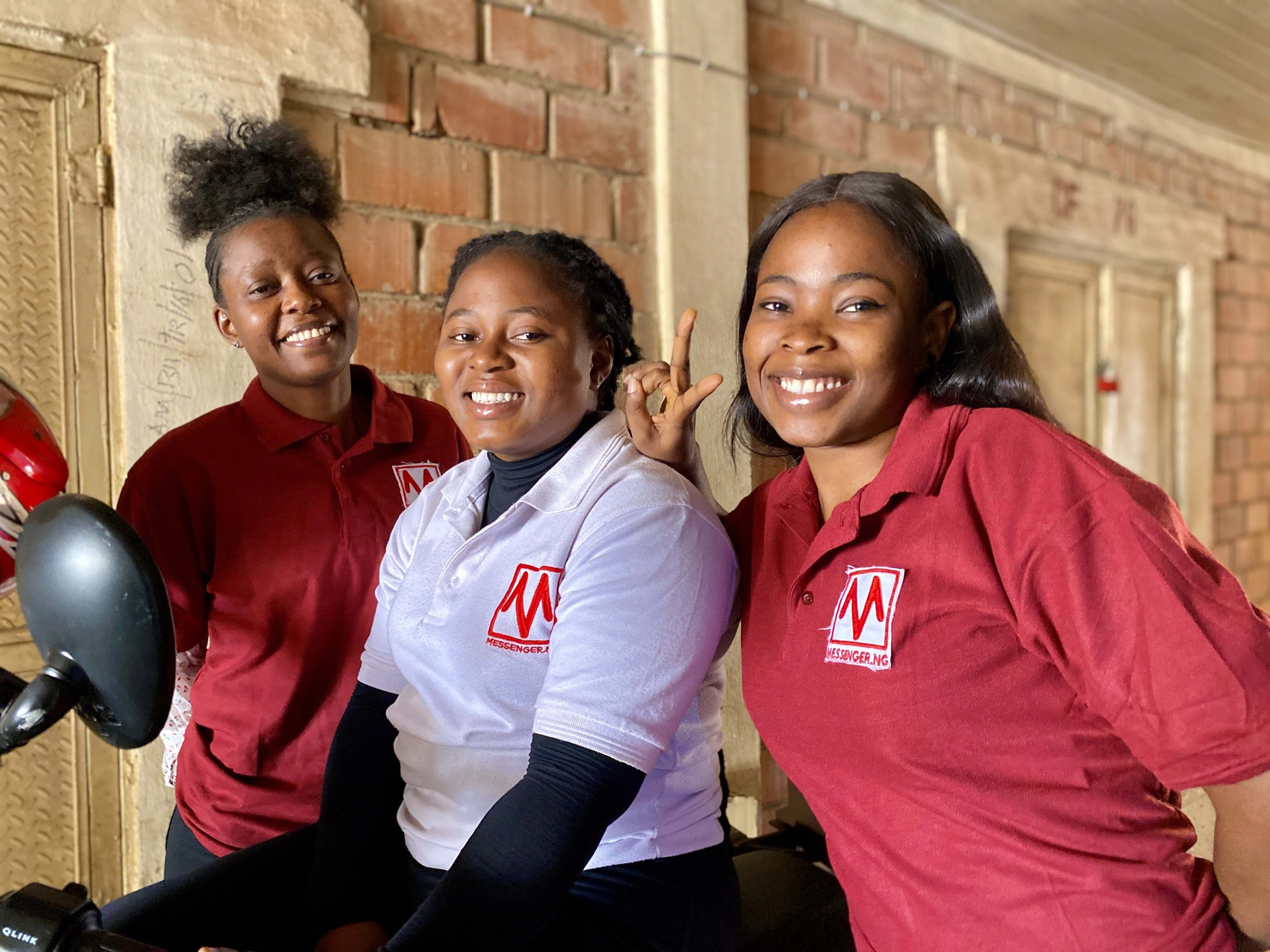
Jordan Ajibola: What were the things that you would say stayed, and what dropped off?
Amanda Etuk: Food deliveries stayed; something that left was home deliveries of groceries from supermarkets.
Jordan Ajibola: Okay. At what point did you incorporate technology? Did you always start as a tech company that onboarded logistics partners? And when you did, how did it change the experience for your customers and also for the businesses and their customers?
Amanda Etuk: One of the regrets that I have is that we did not incorporate technology very early in our business. Also, it would have helped with valuation, structuring our business properly, becoming more attractive to external investors, and simplifying things for our customers. We only incorporated technology towards the end of 2022, when we started to aggregate other providers to handle our demand. What technology has helped us with is integration with other platforms.
Jordan Ajibola: I hear some of the challenges you’ve had—not starting with technology early, some reconciliation processes, and employee fraud—but what would you say have been some of the major wins and successes also during this time?
Amanda Etuk: One of the major wins, I would say, is understanding B2B partnerships and relationships. A lot of those contacts that we've made now have been helpful, and people would always still refer us to other companies in need of the service. So I would say that it was really good for us as a business, reputation-wise, as it gave integrity to our business and got other bigger brands to walk with us just based on those experiences.
Jordan Ajibola: Fantastic. Partnerships are the way to go for businesses. No more building everything alone and from scratch. What would you say were some of the things you've done over the years that built that trust with the customers that make them want to refer you and keep you in long-term partnerships and relationships?
Amanda Etuk: Firstly, we always took responsibility and made sure the finances were balanced between us and our partners, no matter how tough it was. Secondly, leveraging my corporate experience, we successfully handled sensitive tasks during the COVID-19 pandemic, such as transporting medical samples. This led to significant business growth through referrals, showcasing our integrity and expertise.
Jordan Ajibola: As CEO of Messenger, leading a logistics company for over six years undoubtedly posed challenges. Which qualities have been most instrumental in navigating this journey from 2018 to now?
Amanda Etuk: Becoming CEO of Messenger only last year, I transitioned from my previous roles as a co-founder and investor while my brother served as COO. Throughout this journey, relationship building has been paramount. It's not just about networking but establishing valuable connections that foster trust in the brand and myself as a leader. These relationships are essential for customer acquisition and maintaining strong investor relations. Another key quality has been fearlessness in confronting tough decisions head-on. Whether it's taking on challenging tasks or making difficult choices, having the courage to face them directly has been instrumental. Additionally, resilience has played a significant role. As a Nigerian business owner, navigating through both prosperous and challenging times requires an unwavering determination to stay the course. Over the six years of Messenger's existence, this resilience has been indispensable in maintaining stability and inspiring the team to persevere.

Jordan Ajibola: When considering logistics, sustainability becomes a prominent topic, particularly in today's context of climate change and heightened awareness of carbon footprints. Are there any specific practices that your company is currently implementing or planning to implement in the next few years to address sustainability concerns?
Amanda Etuk: We're actively working towards transitioning our fleet to greener options, but it's a capital-intensive endeavour that necessitates finding the right partners to subsidize the process. While our commitment to environmental sustainability is unwavering, we're cognizant of the financial implications for gig workers who rely on our financing for assets such as electric vehicles. Balancing our environmental concerns with the financial well-being of our workforce is paramount as we navigate this transition. If we find the right partner who can make this shift more affordable for us and our riders, we're eager to accelerate our journey towards greener transportation. In addition to our plans for greener transportation, we're already implementing various green practices within our operations. For instance, in Abuja, our team regularly engages in tree-planting exercises and other environmentally conscious activities.
Jordan Ajibola: Okay, are you also looking to expand? Currently, you’re just based in Abuja
Amanda Etuk: Yes, we're predominantly in Abuja, but we do have some B2B partnerships in Lagos. We are looking to expand, and the one that is closest to our radar right now is Dakar, Senegal. We have an interest in francophone Africa, and we’re looking forward to going there before the first half of the year is over. Those are expansion plans for now.
Jordan Ajibola: Looking ahead now, in five years, what should we be seeing about Messenger?
Amanda Etuk: Well, we’re on a journey, but I would say that we’re building the bank for logistics across Africa. So hopefully you see more of us and what we're trying to achieve in the coming months and years. Just look out for us; we want to support more gig workers and all of that.
I'm seeing all the good work that Shipbubble is doing, and I'm so glad we get to partner with you guys. We are looking forward to more great things.
Jordan Ajibola: Thank you, Amanda, for sharing this interesting story of yours with us.
Amanda Etuk: Thank you, Jordan and Shipbubble, for having me.

